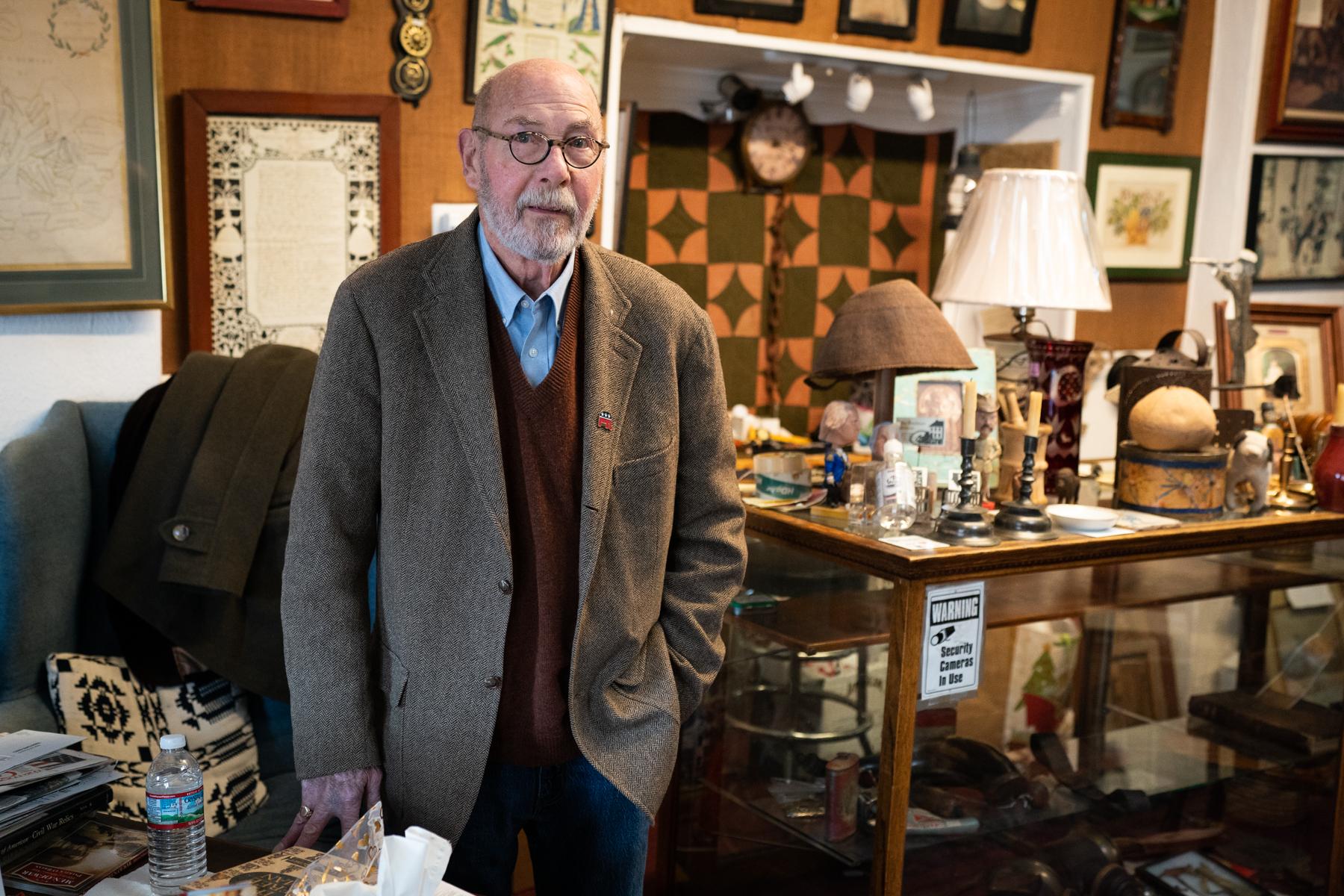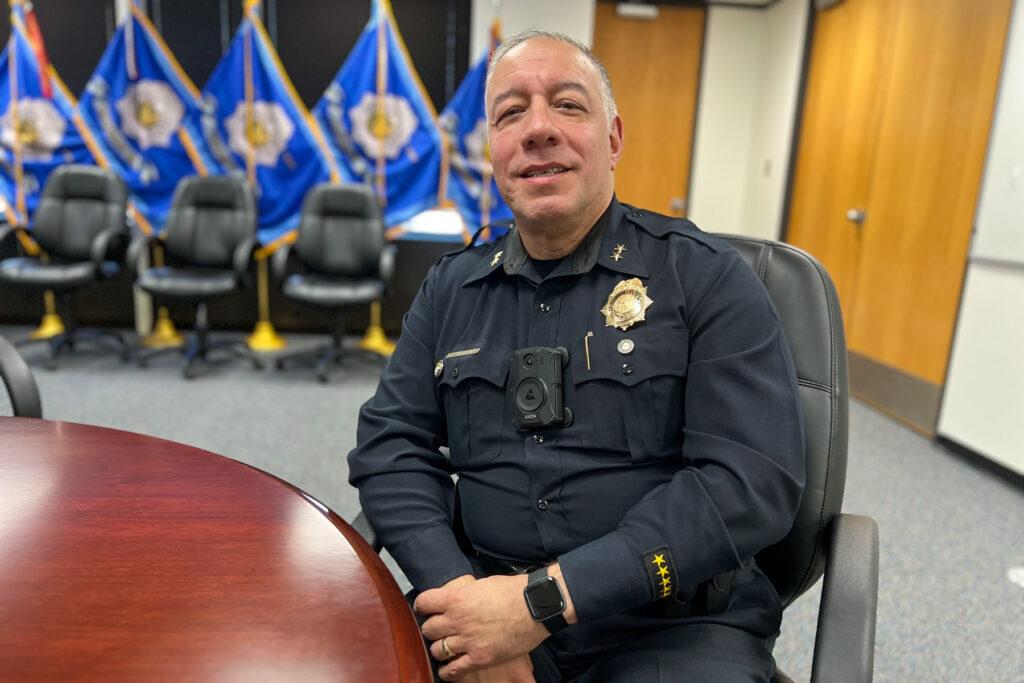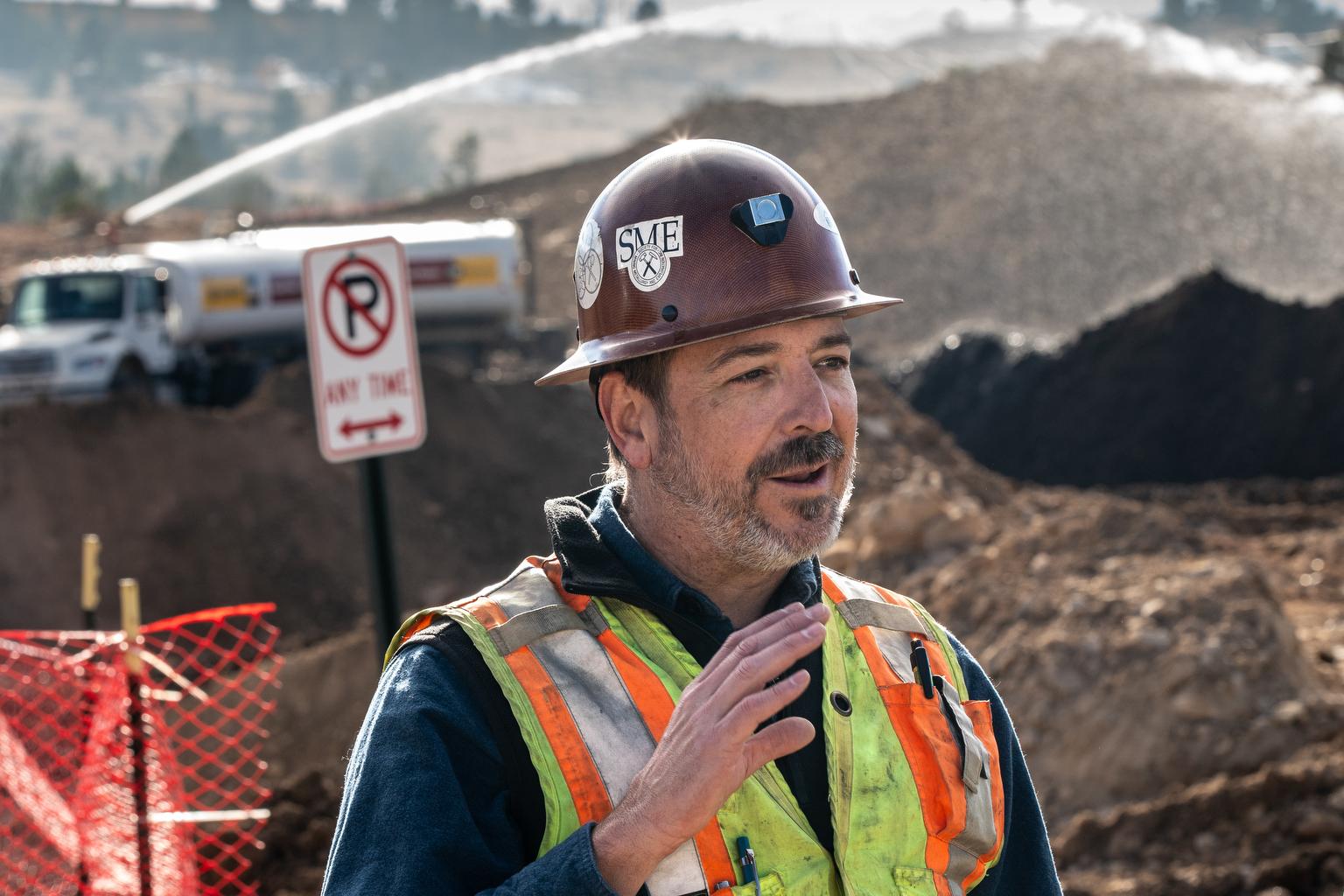
John Boulware and his late brother, Richard, both lived in Denver for more than 40 years.
Both men had notable careers: John runs a well-loved antiques store on South Broadway, and Richard was a prominent photographer and a former executive at the city’s airports. They even lived in the same condo complex.
“I always kind of looked up to him, because he was very successful for most of his career,” John explained one recent afternoon.
But they were never all that close and they went years without speaking. As the two brothers aged into their 70s, John would hear only occasional updates from Richard’s friends.
Increasingly, what he heard was troubling. The friends said Richard was struggling with mental health issues. In recent years, Richard had apparently become a “doomsday prepper” and lived in fear of riots and mob rule.
But John still didn’t see the full picture — not until Richard’s accident.
“I had no idea that he was as deeply involved in that culture,” John explained.
Late in 2021, Richard suffered a knee injury that left him debilitated. John offered to help him through his recovery and the elderly brothers reconnected.
“That was a brotherly thing to do. And so I was carting him around, so to speak, to and from the doctor's appointments,'' John explained. “And that's when I realized that things weren't normal.”
The first time John walked into Richard’s townhome he found a night-vision scope pointed at the door. The place was littered with pistols and rifles. There was a trip-wire attached to shotgun and flash-bang shells.
Soon, Richard started showing off a pistol — pulling back the slide and trying to chamber a round — all while pointing the barrel at John. The family had always been familiar with guns and John himself is a concealed carry permit holder. Still, he was alarmed.
“Very alarmed,” John explained. “Anybody would've been.”
Richard had recently shot his own computer with one of his pistols, his brother said. And he had previously made “vague implied threats” to the board of his homeowners’ association, though no one had wanted to file criminal charges, according to court records.
It’s a situation faced by countless Coloradans: A family member is armed and seemingly unstable. You’re worried they’ll hurt someone but they haven’t committed a crime. What do you do?
The responsibility for such a crisis often falls to individuals who may struggle to navigate legal and mental health systems. But because the Boulwares were in Denver, the situation unfolded much differently thanks to the city’s methodical new approach to so-called red flag cases.
Fully embracing ERPO
Colorado’s "red flag" law went into effect in 2020, allowing judges to order the seizure of firearms from people who are deemed too dangerous to have them. Lasting up to a year at a time, an Extreme Risk Protection Order also blocks someone from legally buying guns.
The law has been used relatively rarely during its first three years. Colorado has tallied only a couple hundred red flag orders — compared to thousands in states like Florida.
Most of the state’s law enforcement agencies have filed red flag orders only in the most attention-grabbing cases, such as when someone threatens to commit a mass shooting or to hurt a police officer. In fact, most departments have never used the law.
But the city of Denver, where the Boulwares’ case played out, is the exception. The Denver Police Department filed about 90 red flag petitions over the law’s first three years. That’s ten times more than the next closest agency. As a result, the city’s courts have issued more than half of the state’s red flag orders.
“When the legislation was passed, the department's decision was to fully embrace it,” said Division Chief Joe Montoya, who oversees Denver’s ERPO efforts.

A review of Denver’s court records reveals that the department has used the law in a wide variety of situations, filing one case or more in many weeks.
The Denver petitions included allegations about dozens of people making suicidal statements; several threatening others or using guns recklessly while suffering apparent mental health crises; and a man planning an attack on his former workplace, among others. Some, like Richard Boulware, had not necessarily made explicit verbal threats, but were behaving in ways that frightened friends and family.
The city’s use of the law puts it alongside just a few other municipalities nationwide that have championed ‘red flag’ laws.
| Do you want to share your experience with Colorado’s ERPO law? Email the reporter, Andrew Kenney, at [email protected] and let us know if you would like to remain anonymous. |
They range from liberal King County in Washington state to conservative Polk County, Fla. They differ in their politics and their population, but they’ve all made an explicit decision to use their states’ red flag laws, said Shannon Frattaroli, a professor at the Johns Hopkins Center for Gun Violence Solutions.
What makes these places notable, she said, is that they “have invested in the infrastructure to make sure that people can use these orders.”
‘Somebody was gonna get killed’
At first, Richard agreed to let his brother take his guns.
It took John an hour to get all the weaponry out of the house: three pistols, three rifles, a shotgun and some 5,000 rounds of ammunition, including armor-piercing and hollow-point rounds.
Soon, another of his brothers, Tad Boulware, arrived in Denver to help.
Tad, like his brothers, is a stringent supporter of the Second Amendment, but he was afraid that Richard’s deteriorating mental health could soon become deadly.
“I was worried that he’d open the door, and there would be somebody there in a brown uniform — and not realizing it was simply a UPS individual, he’s liable to shoot him,” Tad said in a phone interview. “He had no business having those guns … somebody was gonna get killed.”
The situation came to a head when the family agreed to take Richard out of the locked mental-health facility where he’d been forced to stay temporarily.
As part of the deal, Richard would allow his brothers to sell his guns. But he went back on his word, his brothers said, and called the police to accuse them of felony theft.
When a Denver police officer began to investigate, the brothers played an audio recording in which Richard agreed to give up the guns, they said.
The officer recognized that the theft claims were meritless. But instead of simply dropping the case, the officer decided to take action.
The police shuttled away the guns and ammo from John’s home — and started the red flag process.
A patchwork of implementation
Colorado law agencies vary widely in their approach to the red flag laws. Dozens of counties are actively opposed to the law or have put strict restrictions on when it can be used.
Republicans and others in Colorado argue it violates due process, because a judge can issue a preliminary, two-week order before the person is made aware that they’re the subject of a petition. The law also can curtail a person’s Second Amendment rights even when they haven’t been accused of breaking the law.
In El Paso County, law enforcement officials derided the law as “unconstitutional” and said they would only use it where their deputies found probable cause for a crime; the sheriff’s office there has never filed a red flag petition.
Other agencies have accepted the law, but have done relatively little to encourage its use.
For example, the Jefferson County Sheriff’s Office added 13 pages describing ERPO to its policy manual. But the office has not trained deputies specific on the use of the law, since it encounters red flag cases so rarely, said spokesperson Jacki Kelley.
“I feel very comfortable that our deputies are aware of ERPO. They know because they have to read policy. They also have to acknowledge that they read it,” she said, adding: “It’s very rarely used.”
JCSO serves the county’s unincorporated population of roughly 200,000 people. The agency has used the law twice, according to Kelley. The agency’s approach is not unusual, with agencies in Westminster, Fort Collins and Thornton similarly telling CPR News that they had written policies but no documented training procedures for ERPO in response to records requests.
In contrast, a few agencies have intentionally made ERPO a focus for their officers. In Denver, the local government convened officials from local police, the district attorney’s office and the courts to decide how to use the law.
They considered different approaches, such as allowing patrol officers to “take the lead” on ERPO, Montoya said. But they instead decided on a centralized approach.
All officers are trained on the basics of ERPO through a video and a training bulletin, Montoya said. But much of the work of the ‘red flag’ cases falls to a team of experts, who can investigate a case and work with the city attorney’s office throughout the civil court process.
“It takes some time to really look into these and you have a short window,” Montoya said. “It's just not a matter of typing out an affidavit. It's all the background work that goes into this.”
The team now includes two sergeants, four detectives and a lieutenant, with red flag cases making up about half their workload, Montoya said. That centralized approach is a hallmark of other cities that have embraced ERPO, too, said Frattaroli.
In Denver, the courts have also designated a single judge, Elizabeth Leith, who hears practically every Denver ERPO case. Leith has granted year-long red-flag orders in more than 80 percent of the cases filed by police — while the authorities in other areas have sometimes struggled to convince judges that a person is a threat.
The city of Lakewood has taken a similar approach to Denver, assigning a team of officers with mental health expertise to handle ERPO cases. They’ve seized 33 guns in response to 13 court orders, said Commander Jon Alesch.
“We saw the importance of the tool and we saw that the due process was there to ensure the protection of the rights of the community,” said Commander Jon Alesch.
The Lakewood Police Department has filed the second-most ERPO petitions in the state.
How it ended
When the Denver police got involved, things got much simpler for the Boulware brothers.
It was “total relief,” Tad said. “The whole operation could not have been handled better.”
Detective Travis Lloyd filled out a detailed six-page affidavit, summarizing the complex story that had already unfolded. Judge Leith quickly granted a two-week gun removal order.
City attorneys then worked to build a case for a full one-year ban, including by asking the judge to release medical records. An attorney and a guardian ad litem were assigned to represent Richard’s interests.
Richard’s attorney spent 73 hours on the case and was paid more than $6,000 by the court, court records showed. An expert witness, psychologist John Dicke, was paid more than $2,000 by the court.
Meanwhile, Tad, John and other family members were working to make Richard’s home safer and more presentable for him. Soon, the two sides convened for a hearing.
“Everybody had a chance to speak,” said Tad, who attended by telephone.
He hadn’t thought much about red flag laws before, but the experience left him convinced of their benefits.
“We have the right to protect ourselves and our families. And you can't take that away,” he said. “But there comes time — old age, dementia, as happened to my brother — where it's time to go get them, to protect against harm to him and to others.”

While ERPO has been a politically polarized issue since its introduction in Colorado, that’s not the case everywhere. Former President Donald Trump has championed the laws, as has former Vice President Mike Pence. Florida and Indiana, both red states, are among the leaders in their use.
John Boulware, also a conservative, agrees on the law’s value. “I am for Second Amendment rights, but I think there's limits … that call for people not having guns,” he said.
On Dec. 9, Judge Leith issued a one-year gun removal order, allowing police to hold onto Richard’s guns. He returned to his home, but remained isolated, unwilling to see his brothers or friends. The order stayed in effect until the end of his life, two months later.
Richard Stark Boulware died in February 2022. His obituary memorialized the many earlier chapters of his life, including his time as an aerial reconnaissance photographer in the U.S. Navy and as the deputy director of aviation for Stapleton International Airport.
Longtime Denverites may remember one of his most ambitious projects at the airport — a series of large light boxes that displayed images of Colorado from above. Tad and John will remember the difficult end of Richard’s life, but also what he always was — their older brother.
“He's always my loving brother,” Tad said.
Explore our 'red flag' series
- How Colorado lawmakers want to change the ‘red flag’ gun law — or not
- Are mass shootings being stopped by Colorado’s ‘red flag’ law?
- ‘They’re not gonna help you’: Why domestic violence survivors say they’re being failed by police and the ‘red flag’ law
- ERPO in 8 charts: What we learned from reading hundreds of ‘red flag’ cases in Colorado









